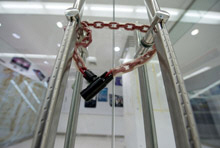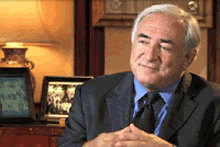
Typical street scene in Santa Ana, El Salvador. (Photo: iStock)
IMF Survey: Social Risks Ahead If Jobs Crisis Is Not Addressed—IMF
September 18, 2009
- Further rise in unemployment poses serious political risk
- Difficult decisions on regulation of banks remain
- IMF could step up role as lender of last resort
In a wide-ranging interview, the IMF’s Managing Director Dominique Strauss-Kahn discussed the outlook for the global economy, the threats to social stability from rising unemployment, and the role of the IMF in a post-crisis world.

”For somebody who loses his job in October, the crisis is not over, it is in front of him” (photo: Wang Zhou/ ChinaFotoPress)
INTERVIEW WITH DOMINIQUE STRAUSS-KAHN
Reiterating concerns he first voiced in a speech at the Bundesbank in Germany on September 4, Strauss-Kahn said he was concerned about the “third phase of this crisis,” namely high unemployment. The IMF is expecting unemployment to continue rising through next year, as economic growth falls short of potential.
What follows below is an edited and shortened version of a video interview Strauss-Kahn gave on September 11, 2009 to the IMF’s Archana Kumar.
IMF Survey online: What will it take for a firm recovery to take hold?
Strauss-Kahn: Our forecast is that a global recovery will take place during the first half of 2010. There are some good figures which have been released during the last few months so it may happen even a little sooner than that.
But if we have in mind that the global economy will only fully recover when unemployment goes down, then it will take more time. Because as everybody knows, there is some delay between the time when growth comes back and the time when the employment situation improves.
IMF Survey online: What do you see as potential risks from the rising levels of unemployment all around the world?
Strauss-Kahn: Well, problems arise when governments tell the public that things are getting better when, at the same time, people are losing their jobs. For somebody who loses his job in October, the crisis is not over, it is in front of him.
"As everybody knows, there is some delay between the time when growth comes back and the time when the employment situation improves."
And that’s a big risk because it’s a social risk. It can also, in some countries, become a risk to democracy if the man in the street finally says: “My government is saying that things are improving, but I don't feel it.” It’s not easy to manage this transition and it will not be easy for the millions of people who will still be unemployed next year.
IMF Survey online: Following the economic crisis, there have been repeated calls for tighter regulation of the financial system. What progress has been made on that front?
Strauss-Kahn: Much progress, but not enough. A lot has been done—analyzing the causes of the crisis, and trying to find solutions. Last week at the G-20 finance ministers meeting in London, there was broad consensus on what should be done. Now, to get from here to establishing new regulations and implementing reforms in each and every country, there are a lot of things still to do.
For instance, in Europe and elsewhere, there has been a discussion about compensation and bonuses. Everybody understands that, 18 months after the beginning of the crisis, we still haven’t fixed the lack of regulation—not only in terms of compensation but in other areas as well.
IMF Survey online: How do you strike the right balance between a regulated financial system and not stifling market innovation?
Strauss-Kahn: Well, that’s a real problem. We certainly need financial market innovation. That’s part of our modern economy. At the same time, one of the big lessons of the crisis—regardless of what philosophical school you belong to—is that if you want the free market to work, you need some regulation because the market is imperfect, and nothing is worse than an imperfect market without regulation.

Strauss-Kahn: ”Problems arise when governments tell the public that things are getting better when, at the same time, people are losing their jobs” (IMF photo)
I’m not on the side of those saying that the more regulation, the better. But we certainly need tough regulation in the financial sector to avoid the kind of culture that leads to excessive risk taking.
IMF Survey online: What has been the international community’s response to the role of the Fund during the crisis?
Strauss-Kahn: Well, that’s not really for me to say. But I think the institution can be proud of the way we tackled the crisis, and I also think our contribution has been broadly recognized by our membership.
Certainly we were not as effective as we should have been in forecasting the crisis, and we are working on enhancing our early warning capacity. But since the crisis began, we certainly have been among the first to see how big it would become, and have provided the right advice in terms of economic policy on the monetary side and especially on the fiscal side.
We also did our job in providing resources to the countries having problems, so by and large I think our role in dealing with the crisis was exactly what the international community would have expected from the Fund.
IMF Survey online: In a few weeks, you will be going to Istanbul for the Annual Meetings of the IMF and the World Bank. What are the Fund’s main goals?
Strauss-Kahn: At last year’s Annual Meetings, the topic was crisis resolution. This time, we will also be talking about post-crisis policies and the new sources of growth.
Now is not the time to implement exit strategies. But we have to discuss them, bearing in mind that the global economy will not be the same after the crisis. It will be a different kind of economy—maybe with fewer imbalances, but also less growth.
"One of the biggest achievements to come out of this crisis was that, for the first time, we had extensive coordination among almost all countries."
The IMF can help its membership coordinate policies, even if there isn’t always a consensus. Probably one of the biggest achievements to come out of this crisis was that, for the first time, we had extensive coordination among almost all countries. That’s the way to deal with the problems in the global economy. My hope is that this spirit of cooperation will survive the crisis. In Istanbul, we want to show that if we want to avoid other crisis like this one, we need economic cooperation of this kind.
IMF Survey online: Looking beyond Istanbul, what are the IMF’s main priorities?
Strauss-Kahn: As I said, we were not as good as we should have been in terms of warning early about the risks of crisis. We’re working very hard on this and are reshaping our surveillance to that effect.
Even beyond the crisis, there will be countries that still have IMF-supported programs. We have to help those countries recover—not only to overcome the crisis, but also to build a foundation for sound growth in the future.
Last, I see a new and enhanced role for the Fund as a lender of last resort. What is interesting about the Flexible Credit Line—which was created by the IMF in April and has been used by Mexico, Poland, and Colombia—is that those three countries understood ahead of others that they could use the Fund to supplement their reserves, and that they don’t need to accumulate huge amounts of reserves that could be better used for investment and development in their own country.
So that could be an enhanced role for the Fund. But for now it’s work in progress and it may not be an easy thing to do, which is okay.
Comments on this article should be sent to imfsurvey@imf.org


